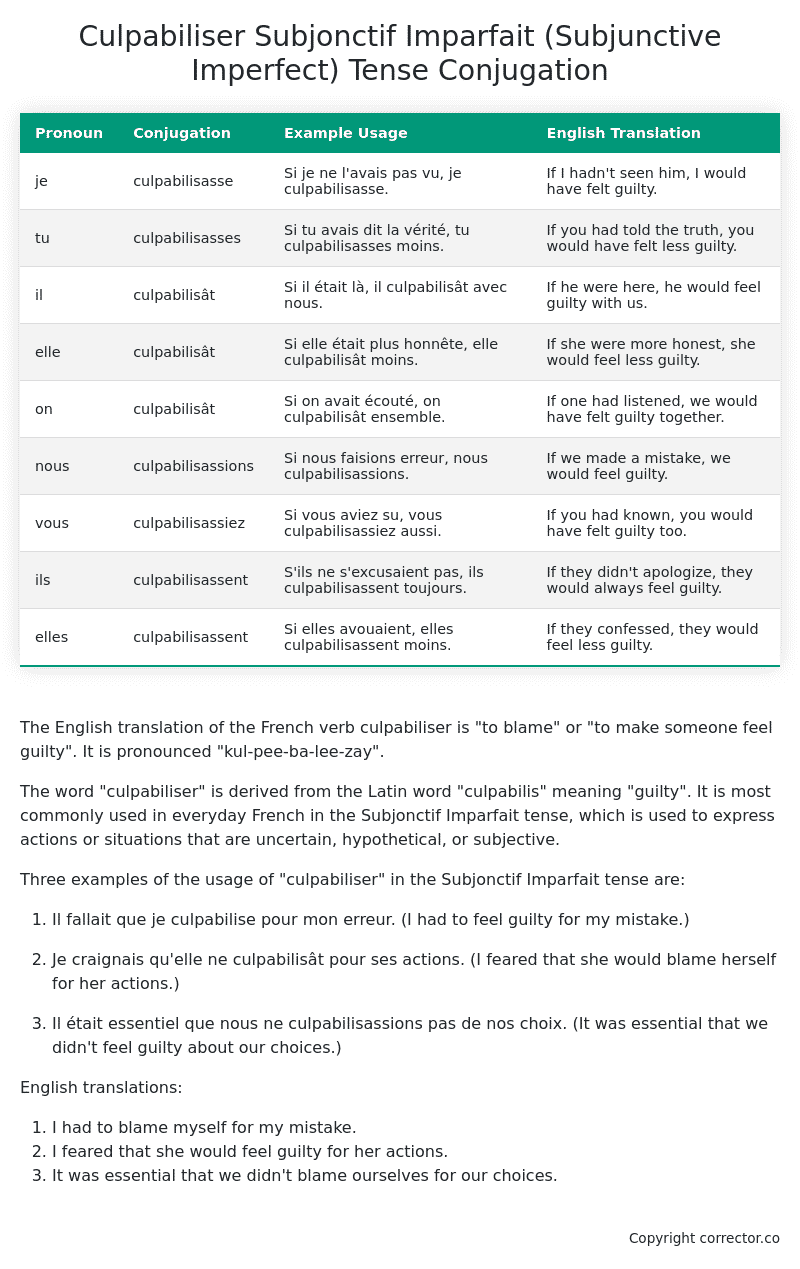Subjonctif Imparfait (Subjunctive Imperfect) Tense Conjugation of the French Verb culpabiliser
Introduction to the verb culpabiliser
The English translation of the French verb culpabiliser is “to blame” or “to make someone feel guilty”. It is pronounced “kul-pee-ba-lee-zay”.
The word “culpabiliser” is derived from the Latin word “culpabilis” meaning “guilty”. It is most commonly used in everyday French in the Subjonctif Imparfait tense, which is used to express actions or situations that are uncertain, hypothetical, or subjective.
Three examples of the usage of “culpabiliser” in the Subjonctif Imparfait tense are:
-
Il fallait que je culpabilise pour mon erreur. (I had to feel guilty for my mistake.)
-
Je craignais qu’elle ne culpabilisât pour ses actions. (I feared that she would blame herself for her actions.)
-
Il était essentiel que nous ne culpabilisassions pas de nos choix. (It was essential that we didn’t feel guilty about our choices.)
English translations:
- I had to blame myself for my mistake.
- I feared that she would feel guilty for her actions.
- It was essential that we didn’t blame ourselves for our choices.
Table of the Subjonctif Imparfait (Subjunctive Imperfect) Tense Conjugation of culpabiliser
| Pronoun | Conjugation | Example Usage | English Translation |
|---|---|---|---|
| je | culpabilisasse | Si je ne l’avais pas vu, je culpabilisasse. | If I hadn’t seen him, I would have felt guilty. |
| tu | culpabilisasses | Si tu avais dit la vérité, tu culpabilisasses moins. | If you had told the truth, you would have felt less guilty. |
| il | culpabilisât | Si il était là, il culpabilisât avec nous. | If he were here, he would feel guilty with us. |
| elle | culpabilisât | Si elle était plus honnête, elle culpabilisât moins. | If she were more honest, she would feel less guilty. |
| on | culpabilisât | Si on avait écouté, on culpabilisât ensemble. | If one had listened, we would have felt guilty together. |
| nous | culpabilisassions | Si nous faisions erreur, nous culpabilisassions. | If we made a mistake, we would feel guilty. |
| vous | culpabilisassiez | Si vous aviez su, vous culpabilisassiez aussi. | If you had known, you would have felt guilty too. |
| ils | culpabilisassent | S’ils ne s’excusaient pas, ils culpabilisassent toujours. | If they didn’t apologize, they would always feel guilty. |
| elles | culpabilisassent | Si elles avouaient, elles culpabilisassent moins. | If they confessed, they would feel less guilty. |
Other Conjugations for Culpabiliser.
Le Present (Present Tense) Conjugation of the French Verb culpabiliser
Imparfait (Imperfect) Tense Conjugation of the French Verb culpabiliser
Passé Simple (Simple Past) Tense Conjugation of the French Verb culpabiliser
Passé Composé (Present Perfect) Tense Conjugation of the French Verb culpabiliser
Futur Simple (Simple Future) Tense Conjugation of the French Verb culpabiliser
Futur Proche (Near Future) Tense Conjugation of the French Verb culpabiliser
Plus-que-parfait (Pluperfect) Tense Conjugation of the French Verb culpabiliser
Passé Antérieur (Past Anterior) Tense Conjugation of the French Verb culpabiliser
Futur Antérieur (Future Anterior) Tense Conjugation of the French Verb culpabiliser
Subjonctif Présent (Subjunctive Present) Tense Conjugation of the French Verb culpabiliser
Subjonctif Passé (Subjunctive Past) Tense Conjugation of the French Verb culpabiliser
Subjonctif Imparfait (Subjunctive Imperfect) Tense Conjugation of the French Verb culpabiliser (this article)
Conditionnel Présent (Conditional Present) Tense Conjugation of the French Verb culpabiliser
Conditionnel Passé (Conditional Past) Tense Conjugation of the French Verb culpabiliser
L’impératif Présent (Imperative Present) Tense Conjugation of the French Verb culpabiliser
L’infinitif Présent (Infinitive Present) Tense Conjugation of the French Verb culpabiliser
Struggling with French verbs or the language in general? Why not use our free French Grammar Checker – no registration required!
Get a FREE Download Study Sheet of this Conjugation 🔥
Simply right click the image below, click “save image” and get your free reference for the culpabiliser Subjonctif Imparfait tense conjugation!

Culpabiliser – About the French Subjonctif Imparfait (Subjunctive Imperfect) Tense
Formation
Common Everyday Usage Patterns
Interactions with Other Tenses
Subjonctif Présent
Indicatif Passé Composé
Conditional
Conditional Perfect
Summary
I hope you enjoyed this article on the verb culpabiliser. Still in a learning mood? Check out another TOTALLY random French verb conjugation!


